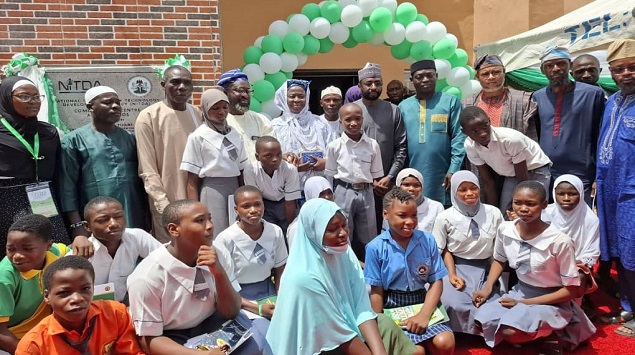General News
Full Potentials of FTZs Unharnessed Inspite Lofty Largesse-Agents

Freight Forwarders alleged that from the vintage point and reports available, the full potentials of the Free Trade Zones (FTZs) in Nigeria have not been fully harnessed, especially in the areas of qualitative and efficient infrastructures, in spite various inceptives given by the government.
Speaking under the auspices of National Association of Government Approved Freight Forwarders (NAGAFF), the agents are of the view that the FTZ policies and principles need to contain provisions that would compel investors to see as an obligation to develop the centres for the interest of all parties involved.
Dr. Boniface Aniebonam, founder of the Association in a statement made available to Nigeria CommunicationsWeek identified, at the same time, that there must be incentives like electricity, good roads, access to raw materials and labour etc that would encourage and attract foreign direct investment to the Zones.
“Above all, Government at all levels should strive to guarantee peace and stability which are the two major attractions for FDI,” he said.
Aniebonam also frowned at unprofessional conducts of some Agents at the Zones admonishing them that Free Trade Zones should be regarded as a country within a country.
He said: “It is important that practitioners should know that Free Trade Zones are regarded as a country within a country. The essence of Free Trade Zone is to bridge the distance between the foreign manufacturers and the consuming nations. It is also expected to generate employment for the local nationals and equally transfer technology.
“Operations at free trade zones are expected to save cost in freight charges in a country like Nigeria whose import is based on cost, insurance and freight. Free Trade Zones are expected to accommodate semi-finished products, raw materials and machineries only.
“It is most unfortunate that information reaching NAGAFF Headquarters indicate that some freight forwarders may be acting in ignorance by involving themselves in clearing goods like rice, wine, furniture and car battery into the free zones without payment of Customs duty. This is very wrong and should have to stop immediately.
“We want to emphasise that one of the major problems in our seaports and border station operations has to do with the non-compliant attitude of the importers and freight forwarders. It has not been easy with the Nigeria Customs Service to contend with this unprofessional act. Free trade zone operation in Nigeria is becoming a factor in our foreign trade and it is our belief that we should not allow what is happening at the ports and border locations to rear their ugly head in that virgin area.
“We want to state clearly that any attempt to take into Free Trade Zones finished products in contravention of Customs laws is an act of smuggling and the law is very clear in that regard. It is equally important to note that goods manufactured in the Free Trade Zones are expected to pay
Customs duty before they could be allowed by Customs to enter Nigeria. It is either way for all finished products in the Free Trade Zone operation”.
The NAGAFF founder also enjoined all practitioners to ensure due compliance and they should not allow anybody to use them to flout the laws governing Free Trade Zone operations.
“We will not fail to mention that we have noted some sort of blackmail against the Nigeria Customs Service in ensuring best practices in the Free Trade Zones in some parts of the country and we are monitoring the situation.
“It is on record that Nigeria Customs Service may have impounded about 52,000 bags of rice, 80 x 40’ containers of wine, 90 x 40’ containers of furniture and 7 x 20’ containers of motor battery entering into the Free Trade Zones without payment of Customs duty. It is our belief that the management of Free Trade Zones should ensure the rules of engagement to avoid putting our members in problem.
“It shall therefore be an act of sabotage to do otherwise to the contrary. At the moment only Calabar Free Trade Zone and Onne Oil and Gas Free Trade Zone are operating at 80% capacity. Others like Kano, Banki and Lekki Export Processing Zone etc are under construction,” he added.
It is on record that the Federal Government had enabled incentives to Free Trade Zone operators which shall include but not limited to; exemption from payment of all federal, state and local taxes, levies; rates, and Customs duties on semi finished goods, raw materials and
machinery; repatriation of foreign capital investment in EPZs at any time with capital appreciation on the investment; no import or export licence; rent free land during construction of factory space and services such as warehousing, standard pre-built factories, transportation, sanitation, canteen, etc, are available within the zones.
There are also unrestricted remittance of profits and dividend earned by investor in the zone; 100% foreign ownership of enterprises in the EPZ allowable and sale of up to 25% of production permitted in the domestic market, however, the Zones have not yielded expected results.
General News
NOTAP Urges South Eastern Entrepreneurs to Embrace Franchising as Business Model

Dr. Obiageli Amadiobi, director general and chief executive officer, National Office for Technology Acquisition and Promotion (NOTAP), has advocated Franchising as a sustainable business model for the South East entrepreneurs.

Dr. Obiageli Amadiobi, DG/CEO, NOTAP
She made this call during a one-day sensitization and unveiling of the NOTAP Franchising Guidelines for south east stakeholders and entrepreneurs for a successful franchising business.
The DG who was represented at the event by Mr. Emeka Orji, head of Department Corporate Planning (CP) Department, NOTAP, said that franchising business model had globally been proven to be successfully sustainable due to low business risks associated with it.
She defines franchising as a contractual business relationship between a licensor (the franchisor) and a licensee (the franchisee) that allows the business owner to use the licensor’s brand and methods of doing business to distribute products or provide services to consumers.
She added that in essence, the franchisee pays the franchisor for the opportunity to use his established business model and brand name in running his business.
Dr. Amadiobi said the essence of the workshop was not just organised to explore the possibility of adopting franchising as a strategic platform to transform local dreams into national and global business realities.
She described the programme as an opportunity for business owners and intending entrepreneurs from the Zone to latch into the huge and untapped potentials provided by franchising business models in becoming business and brand ambassadors.
With over 800,000 franchise establishments across the globe, generating trillions in revenue, she described Franchising as a pathway to economic empowerment.
General News
FG Launches Online Citizenship, Business Management Portal to Enhance Transparency, Service Delivery
The Federal Government has launched a new Online Citizenship and Business Management Platform, in a bid to boost transparency, operational efficiency, and service delivery. The initiative, unveiled by the Ministry of Interior, is in line with the Renewed Hope Agenda of President Bola Ahmed Tinubu.
![]()
The platform is designed to simplify and accelerate the processing of citizenship and business-related services, allowing individuals and corporate entities to carry out transactions seamlessly from anywhere in the world.
According to a statement issued by Magdalene Ajani, Permanent Secretary of the Ministry, the digital platform represents a significant milestone in the Ministry’s ongoing reform agenda.
It noted that the new system would drastically reduce bureaucratic bottlenecks, enhance user experience, and improve turnaround time for applications. “The Ministry is committed to promoting a more efficient, transparent, and secure framework for citizenship administration.
“This digital transformation is a testament to our resolve to improve public service delivery through the use of technology”, the statement reads.
Members of the public, private organisations, and other stakeholders can now access the platform through the Ministry’s official website: https://interior.gov.ng, or directly via the portal: https://candb.interior.gov.ng. For technical support or inquiries, users can contact: candb-support@interior.gov.ng.
The Ministry emphasised that the launch of this platform is just one of several digital initiatives aimed at transforming the nation’s administrative processes and aligning them with global best practices.
Observers believe the platform could become a game-changer in reducing red tape and promoting a more investor-friendly environment in Nigeria, particularly in areas involving citizenship acquisition and business operations.
General News
NITDA DG says its Community IT Centres Should be a Catalyst of Change

Kashifu Inuwa Abdullahi, director general of National Information Technology Development Agency (NITDA) has said that the 18 community IT centre the agency has built in the past two years are meant to be a beacon of calls and catalyst of change in those communities where they are cited.

He sated this at the commissioning/handing over of IT centre at Akesan area in Lagos. He noted that the IT centres, Innovation hubs among others are part of digital literacy programme of the agency.
“This center is designed and build to help Akesan community to be part of the digital economy, because the President is big and loud when it comes to national prosperity and inclusivity.
“Our target is to build more than 1600 across the country. We want every community every Nigerian to be part of this national prosperity and inclusivity when it comes to digital economy.
“Today, we are here to commission it, to ensure and encourage you to put it in a good use, because we call it a community center means that we want everybody to be part of it. We don’t want it to be suited in a school where the school will lock it for only students and the staff.
“That’s why we located it in the community. Schools can be part of it. Our senior citizens can be part of it. Our religious centers also can be part of it to learn.
“We want it to be a beacon of call as well as a catalyst of change in this community. We want to see more information technology gurus coming from Akesan community. So, I want to encourage you to also come with a sustainability model so that the center will be on. It is on because when you invest in this kind of infrastructure, we don’t want to be called when there are small things that we should come and fix it. That’s why we are handing it over to the community so that the community can put it in a good use. The community can find a way to make it self-sustaining,” he said.
Dr. ‘Bosun Tijani, Honourable Minister of Communications, Innovation & Digital Economy, the NITDA Community Centre in Lagos, a space that is more than just a building. It is a strategic extension of our national mission – a bridge between the Federal Government’s digital economy policies and the unmatched energy, ingenuity, and innovation that Lagos represents.
The minister who was represented by Mr. Johnson Bareyei, director, e-governmance in the ministry, added that his ministry is committed to promoting inclusivity through capacity building initiatives like the 3MTT programme.
“We are also developing the National Digital Economy & e-Governance Bill, which is a robust legislative framework that will help guide our everyday engagement online.
“Our work at the Ministry also includes Project BRIDGE, our ambitious effort to improve interconnectivity by deploying 90,000km of fibre-optic cable across Nigeria. This is a critical imperative as we work towards making Nigeria a $1trillion economy powered by innovation, infrastructure, and inclusive growth,” he said.

 Telecom2 days ago
Telecom2 days ago₦800 Billion Infrastructure Plan Set to Boost MTN’s Network Quality Nationwide

 E-Business2 days ago
E-Business2 days agoNITDA, CISCO Empower Youth with Digital Skills

 News2 days ago
News2 days agoCreative Economy Ministry Secures $300M Investments Commitment

 E-Financial2 days ago
E-Financial2 days agoFidelity Bank reclaims trillion-naira market cap as stock rises to ₦21

 Telecom2 days ago
Telecom2 days agoAfrican Women Hit Hardest as Mobile Internet Gender Gap Persists

 General News2 days ago
General News2 days agoNITDA DG says its Community IT Centres Should be a Catalyst of Change

 Telecom2 days ago
Telecom2 days agoRemita’s Bold Leap: Nigeria’s Fintech Giant Expands Across Africa

 E-Financial2 days ago
E-Financial2 days agoKuda Co-founder Urges Young Developers to Build Tech with Purpose @NACOSS 2025


























